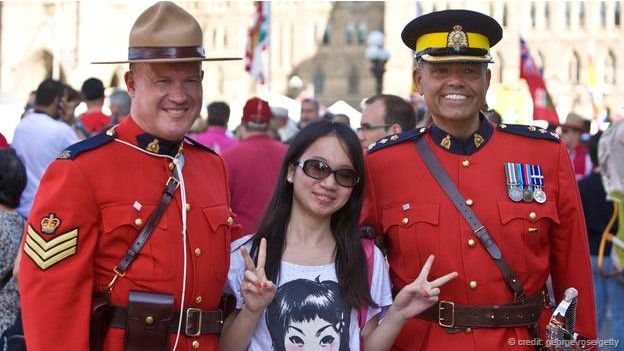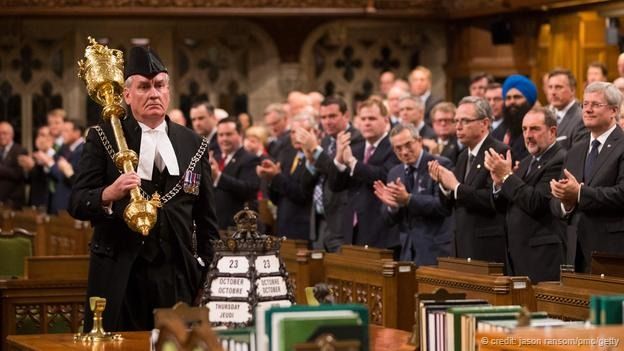谦逊友善 加拿大引以为傲的丰盛资源
BBC埃里克·魏纳(Eric Weiner)(2023年8月15日)

加拿大多伦多的天际线(图片来源: 图片来源: Naeem Jaffer/Getty)
每年八月,我家都会进行一项美国家庭的传统活动: 自驾游。 通常我们都是一路向北。加拿大或许并非最具异国情调的目的地,但异域风情有时候总被夸大。加拿大是我们友好邻邦,不仅气候舒适宜人,最重要的是,加拿大居民礼貌、友善、待人热情。
一到达边境关口,我们就感受到了加拿大人的友好。 美国边境的边防人员比较粗鲁,不苟言笑,而加拿大那边恰恰相反,即使在盘问带入境的酒的数量时,他们也始终彬彬有礼。
有一年,在入境时我们才注意到9岁女儿的护照过期了,可他们还是很友好地让我们入境。无论是服务员、酒店职员还是路人,大家都非常友好,乐于助人,整个旅途都能感受到这种友好的氛围。

正在庆祝加拿大国庆日的加拿大皇家骑警(图片来源: George Rose/Getty)
加拿大式的友善不带美式友善的那种强加于人的味道(祝您愉快!不然就……!),是纯粹的,而且到处都是。 友善之于加拿大,就像石油之于沙特阿拉伯,充溢丰盛,遍地流淌。我觉得其他国家现在应该从加拿大进口一些友善了。(在最近一份由游客评选的排行榜上,法国、俄罗斯以及英国位居粗鲁国家排行榜前列)。
研究人员尚未对加拿大式友善展开实证研究,但有些分析发现,他们大量使用诸如“有可能”“不错”等较委婉的“缓冲词”,这或许表明他们一直都在避免冒犯别人。 “对不起”是加拿大人最常用的词。他们时刻将“抱歉”挂在嘴边,对任何人、为任何事都会道歉。
“我会向撞到的树木道歉,”迈克尔.维尔皮 (Michael Valpy)坦言。他是一名记者兼作家,他注意到其他市民也会这样做。 多伦多和蒙特利尔的交通情况可能比较糟糕,但“即使在交通最拥堵时,你也几乎从来听不到汽车鸣笛声,”多伦多大学新闻学教授杰夫瑞.德沃尔金 (Jeffrey Dvorkin) 表示。 在加拿大,鸣笛被认为是很过分的蛮横。而且,加拿大的凶杀率很低,他表示,部分原因是人们认为“杀人实在太野蛮”。

温哥华风景,加拿大(图片来源: Bruce Bennett/Getty)
加拿大的新闻里随处可见报道身边的好人好事的文章。 例如,《国家邮报》曾报道,在埃德蒙顿,法律系学生德里克.穆雷 (Derek Murray)的汽车前灯一直亮着。
当他回到车上时,发现电池电量耗尽,有人在挡风玻璃上留下字条。 “我注意到你离开时,车灯还亮着,”字条上写着, “汽车电池可能不够用,汽车无法发动。 我在栅栏上留有蓝色电源延长线……栅栏边的硬纸板箱里有电池充电器。” 字条上还详细解释了如何启动汽车。“祝你好运。”字条最后写道。
在安大略省,一个小偷不仅归还了自己偷盗的物品,还写了封道歉信,随信附上50加元。“我的歉意难以言表,”小偷在信里写道,“恳请原谅我这个曾经伤害你们的陌生人。”
加拿大人不仅礼貌友好,而且非常谦虚,做了好事也不留名。2014 年10月,一名持枪者袭击了加拿大国会大厦。议会警卫凯文.威克斯 (Kevin Vickers) 反应敏捷,沉着地用他平时放在办公室的手枪向暴徒射击。而当加拿大的新闻媒体报道赞扬威克斯的英雄事迹时,受到赞颂的是他的谦逊,而非高超的枪法或过人的胆识。(加拿大人以他们的谦虚为傲,且没人觉得这种矛盾有什么不妥。)

2014年十月,议会警卫官凯文.威克斯在议会授勋(图片来源: Jason Ransom/PMO/Getty)
如何解释这种谦逊友善呢? 蒙特利尔作家塔拉斯.格雷斯科 (Taras Grescoe) 认为,加拿大人的友善根植于生存必须。“虽然我们的领土面积位居世界第二,但我们人口稀少,”他说,“我们从一开始就知道,为了生存,或者只是保持心理正常,大家就必须互相照应。你看,街上这位老太太,还有公交车站那个在零下五度的天气忘戴围巾的少年。所以说,我们通常都愿意向他人提供帮助,而不是攻击挑衅。”
另一个解释源自“碎片理论”。 该理论最先由美国学者路易斯.哈慈 (Louis Hartz) 提出。它认为,美国、加拿大等前殖民地社会是它们移居新大陆时逃离的欧洲社会的“零星碎片”,客观上,这些新兴国家可以说“冻结”在某个时代节点。因此,加拿大传承了英国保守派的一些特点;跟激进的美国开国元勋们拥抱接纳的那一套相比,加拿大更显恭顺、“友善”。
但并非所有人都认为这是好事。 维尔皮认为加拿大人的友善是一种防御机制,这种心理“来源于自卑和尴尬,因为意识到自己衣服不合身、发型糟糕、庸庸碌碌而产生的那种尴尬和自卑。”

索契冬奥会上的加拿大运动员(图片来源: Jonathan Nackstrand/AFP/Getty)
但在这个友好国度,有时却因大家都过于友好而产生问题。 最近从尼泊尔移居加拿大的作家曼都舍里.塔帕 (Manjushree Thapa)回忆起在影院观影时的一次经历。放映过程中银幕逐渐暗下来,最后变成一片漆黑,因为放映灯烧坏了。但始终无人说话。
最终她被激怒了,让旁边的加拿大朋友去告知影院经理。她的朋友很不情愿地这么做了。“礼貌会让这里的人沉默,”她说。
但总体来说,她将会度过友好愉快的每一天。我也一样。
生活的道路已充满坎坷,艰辛难行。我们何不以更加友好谦逊的态度来对待生活呢?
礼貌友善是尊重他人的最好方式,尤其是对待陌生人。礼貌如同润滑剂一般,减少冲突,让社会更加和谐。
而且我认为,如果我们都向加拿大人学习一些礼貌友好之道,世界将会更美好。
幸运的是,加拿大人的友善有传染性,可以感染他人。在一年一度的北上之旅中,我发现自己变得温和,更多地使用礼貌用语,向他人表达“感谢”之情。或许我有点矫枉过正,反而让礼貌变得油腔滑调。如果真是这样,那我只能以真正的加拿大方式,致以歉意。
(责编:郱书)
Can Canada teach the rest of us to be nicer?
We experience Canadian nice as soon as we reach customs. The US border guards are gruff and all business. The Canadians, by contrast, are unfailingly polite, even as they grill us about the number of wine bottles we’re bringing into the country. One year, we had failed to notice that our 9-year-old daughter’s passport had expired. They, nicely, let us enter anyway. The niceness continues for our entire trip, as we encounter nice waiters, nice hotel clerks, nice strangers.
Canadian niceness is pure, and untainted by the passive-aggressive undertones found in American niceness (have a good day, or else!). It’s also abundant. Canada is to niceness as Saudi Arabia is to oil. It’s awash in the stuff, and it’s about time, I say, the rest of the world imported some. (France, Russia and the UK topped one recent list of rude countries as perceived by travellers.) Researchers have yet to analyse Canadian niceness empirically, but studies have found that Canadians, perhaps in an effort not to offend, use an overabundance of “hedge words”, such as “could be” and “not bad”. Then there is the most coveted of Canadian words: “sorry”. Canadians will apologize for anything and to anything.
“I've apologized to a tree that I walked into,” confessed Michael Valpy, a journalist and author, noting that many of his fellow citizens have done the same.
Traffic in Toronto and Montreal may be awful, but “you almost never hear a horn, even in the most frustrating traffic jams”, said Jeffrey Dvorkin, a Canadian journalism professor at the University of Toronto. Horn-honking is regarded as unnecessarily aggressive. And murder rates in Canada are low, he said, partly because “it’s quite rude to murder someone”.
The Canadian press is rife with examples of niceness in action. For instance, the National Post reported that in Edmonton, a law student, Derek Murray, left his headlights on all day. When he returned to his car, he found the battery drained and a note on his windshield. “I noticed you left your lights on,” it read. “The battery will probably not have enough charge to start your vehicle. I left a blue extension cord on the fence and … a battery charger beside the fence in the cardboard box.” The note went on to explain exactly how to jump-start the vehicle. “Good luck,” it added. In Ontario, a thief returned the goods he or she stole with $50 attached to a letter of apology. "I can't put it into words how sorry I am," the thief explained. "Please find it in your hearts to forgive the stranger who harmed you."
Canadians aren’t only polite; they’re incredibly humble too, and reluctant to take credit for even plainly heroic acts. When a gunman attacked the Canadian parliament building in October 2014, Kevin Vickers, Canada’s sergeant-at-arms, responded quickly and calmly by shooting the assailant with the handgun he keeps in his office.And while Vickers was glorified in the Canadian media, it was his humility, not his marksmanship or bravado, that was celebrated. (Canadians take great pride in their humility, an oxymoron that bothers no one.)
What explains this blizzard of humility and politeness? Taras Grescoe, a Montreal-based writer, believes Canadian niceness is born of necessity. “We're a small group of people, spread across the second-largest national territory in the world,” he said. “We've always known that, in order to survive – or just stay sane – we had to watch out for one another. The old lady down the street, the teenager at the bus stop who forgot to bring a scarf when it's 5 below. Hence our general willingness to proffer assistance rather than aggression."
Another explanation for Canadian niceness stems from the “fragment theory”. First posited by the US scholar Louis Hartz, the theory states that colonial societies such as the United States and Canada began as “fragments” of the European nations they were escaping from. These new nations remain, in effect, frozen in time. Thus, Canada retains a conservative, Tory streak – that is, with a more deferential, “nicer” nature than the one embraced by the feisty US founding fathers.
Not everyone believes this is a good thing. Valpy sees Canadian niceness as a defence mechanism, one that “stems from inferiority and an awkward awareness that our clothes don't fit properly and we always have bad haircuts and really don't do anything great.”
Also, in the land of nice, problems sometimes fester because everyone is too nice to say anything. Manjushree Thapa, a writer who recently moved to Canada from Nepal, recalls sitting in a movie theatre when the screen grew dimmer and dimmer as the projection bulb slowly burned out. The screen was almost black but no one spoke up. Exasperated, she finally prodded her Canadian partner to alert the management, which he did, reluctantly. “Niceness can silence people here,” she said.
Overall, though, she’ll take nice any day. And so will I. Life is hard enough, with plenty of jagged edges and pointy bits. Why not coat it with a glaze of politeness and humility? Politeness, at its best, is a way of honouring others, especially strangers. Politeness is the lubricant that makes social interactions run smoothly and reduces the risk of conflagrations. The world, I think, would be a better place if we were all a bit more Canadian.
Fortunately, Canadian niceness is contagious. On my annual northern migration, I find myself slowing down, saying “thank you” and “please” more often that I usually do. Maybe I go too far and cross the line from polite to unctuous. If I do, I can only say, in true Canadian fashion, I’m sorry.